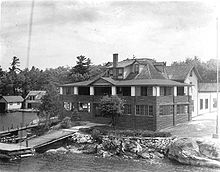Delawana Inn
A major contributor to this article appears to have a close connection with its subject. (May 2024) |

The Delawana Resort is a Canadian hotel and resort in Honey Harbour in Georgian Bay, Ontario.[1] It was formerly called Delawana Inn.
History
[edit]This section needs additional citations for verification. (May 2024) |
Honey Harbour and the site of the Delawana Inn had a beach area for bathing.
Nathan Nickerson identified the site as a suitable location for a hotel. Nickerson and his wife Anne, had operated a store in Midland for twelve years, a sawmill, Nickerson Brothers' Mills in Hogg's Bay, (Victoria Harbour) and with his sons Albert and Charles, established the hotel known as the Victoria House on the present site of The Delawana Inn & Resort. When the hotel opened its doors in 1897, Nickerson was approximately seventy years old.
For fifteen cents, according to the ad in the Midland Free Press, the steamer "Odessa" would take guests from Victoria Harbour to Honey Harbour. All guests and supplies had to be transported by boat since there were no roads. Accommodations were available for the night or the week. Guests had the use of boats, meals were supplied, picnic lunches created, and ice cream and confectioneries were available. The hotel was a two-story wooden structure with extensive verandahs. During the early years, Victoria House was a fishing camp without electricity or telephones.
In the 1920s, Charles Nickerson, Nathan's son, sold Victoria House to the Grisé brothers; they had operated The Royal Hotel (a four storey building with a dock c. 1903 and closed mid 1970s then demolished) across the channel on Royal Island. Fred Grisé, who had managed a liquor store in Penetanguishene until prohibition ended that venture, took over the operation of the mainland hotel. Fred's son, Didace, along with Fred's daughter-in-law, Mary, became the managers.
Under the Grisé family, the hotel became The Delawana Inn after a merger of the Victoria Hotel and the Georgian Hotel.[2] The name was inspired by a local Chief named Delawana.[3] His daughter, Wah-Soo-na, and her two dogs, were killed by a falling rock.
In the 1920s, more cabins were built to increase capacity. Lighting was by acetylene, water was heated by wood, laundry was done by hand and huge icehouses provided refrigeration.
By 1935, the Marine Wing was added, providing twenty more rooms, two of which had private baths. Four rooms in the main building contained a bath, eleven had running water, and the remaining seventeen had "still water service". The new kitchen had a dishwasher and oil-fired stoves. Capacity at The Delawana was one hundred guests, most of them fishermen.
Didace Grisé tried to make his hotel competitive and up–to-date. He hired dietitians to work in the kitchen; telephones were available twenty-four hours a day, CNR telegrams were sent and received, and running water was installed during the war years.
A fire happened in August 1952, which burned the main building to the ground.[3][4] The Grisés did not have insurance, so they turned to private financing and reopened in the following spring. The new main building contained ten rooms, which qualified The Delawana for a beer and wine license. More units with private baths were built and the increased prices were met with some resistance. An aggressive advertising campaign soon attracted conference groups. In July 1973, a second fire destroyed the building and again the family rebuilt.[3] Didace Grise died in 1974, leaving ownership to Mary Grise and two of her sons.
In the 1970s the bar of the Delawana Inn was the site of violent confrontations between the Hells Angels and local Ojibwa families.[5]
Helga Loverseed of The Globe and Mail in 1993 called the "plainly decorated, turn-of-the-century" hotel "an anachronism in today's modern world", writing that unlike most of Ontario's hotels, it had not been renovated. She wrote, "Self-respecting yuppies probably wouldn't set foot in the place it isn't nearly glitzy enoughbut it's a favourite vacation venue for seniors, older 'singles' and grandparents".[6]
From inn to resort
[edit]In 1996 the resort was purchased by a development company from Toronto and went into receivership in 2013. Under new ownership, the resort reopened in 2014.
The resort has suite units, rooms and individual cottages.
In 2015 the Delawana Inn changed its name to Delawana Resort (dropping the word 'inn' while still keeping the historical 'Delawana'). This was to prevent confusion due to the lack of an actual inn being on the property anymore.
References
[edit]- ^ "Resort of the Week: Delawana Inn". Toronto Star. 1998-06-27. Archived from the original on 2024-05-03. Retrieved 2024-05-03 – via Newspapers.com.
- ^ Boyer, Barbaranne (1987). Tatley, Richard (ed.). Muskoka's Grand Hotels. Erin, Ontario: Boston Mills Press. p. 174. ISBN 0-919783-74-0. Retrieved 2024-05-03 – via Internet Archive.
- ^ a b c Tice, Janet; Wilford, Jane (2008) [1986]. 100 Best Family Resorts in North America: 100 Quality Resorts with Leisure Activities for Children and Adults (9 ed.). Guilford, Connecticut: Insiders' Guide. pp. 244–247. ISBN 978-0-7627-4529-6. ISSN 1536-6170. Retrieved 2024-05-03 – via Internet Archive.
- ^ "A Summer Hotel". The Canadian Architect. No. 9. 1956-09-01. pp. 37–42. ISSN 0008-2872. ProQuest 1617887997.
- ^ Jepson, Tim; Lee, Phil; Smith, Tania; Williams, Christian (2004). The Rough Guide to Canada. New York: Rough Guides. p. 154. ISBN 978-1-84353-266-8. Retrieved 2010-05-26.
- ^ Loverseed, Helga (1993-10-06). "Delawana Inn's hominess popular with older travellers". The Globe and Mail. ProQuest 1143805881.
